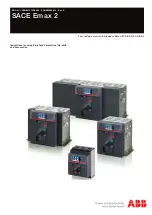
23
E
Closing of ACB only in distinct Service/Test/Isolated positions
ensures safety of the operating personnel
E
Door-Racking interlock prevents rack-in/rack-out operation of
breaker if panel door is open
E
Modular safety-shutters to prevent unintended contact with
terminals
E
Rating Error-preventer avoids the breaker-cradle mismatch of rated
current & breaking capacity version
E
Option to pad-lock the ON/OFF push buttons independently to
prevent unauthorized operations
E
Facility to lock breaker in OFF condition offers the key-lock based
interlocking arrangement
E
Option for pad-locking the racking-shutter prevents the inadvertent
racking operation & facilitates implementation of ‘LOTO’ system in
industry
E
Flexibility of locking the ACB in all positions or only in disconnected
position
E
Door-interlock prevents the opening of panel door in Service & Test
positions
E
Double insulation from Front Face (Class II operating safety)
E
Shock & Vibration Protection as Per IEC-60947-1/IEC-60068-2-6/27
Vibration : 2 to 13.2Hz +/-1 mm
13.2 to 100Hz 0.7g
Shock: 15g for 11ms Half-sine wave
ACB “
A Basket of Benefits
”
24
A
N
T
I
-
P
U
M
P
I
N
G
I
N
O
M
E
G
A
A
I
R
C
I
R
C
U
I
T
B
R
E
A
K
E
R
Anti-pumping device is one which prevents the breaker from reclosing after an opening operation even though the
device initiating closing is maintained in the position of closing.
Anti-pumping is generally achieved by providing electrical interlocks which ensure that the persistent closing
command breaks the moment the breaker trips on fault or opens. The breaker can then be reclosed only after a fresh
command is given. This method of providing anti-pumping is known as electrical anti-pumping.
Following anti-pumping methods are used to ensure reliability of entire distribution system.
• M
e
c
h
a
n
i
c
a
l
a
n
t
i
-
p
u
m
p
i
n
g
Mechanical anti pumping is achieved by providing linkage interlocks which ensure that anti-pumping lever does
not reset until the manual persistent closing command is relieved. Even in case of a fault, breaker trips but the
anti-pumping lever remains in the downward position until a persistent command is relieved. Hence the breaker
can be reclosed only after a fresh command is given.
• E
l
e
c
t
r
i
c
a
l
a
n
t
i
-
p
u
m
p
i
n
g
a
)
B
y
p
r
o
v
i
d
i
n
g
e
x
t
e
r
n
a
l
c
i
r
c
u
i
t
To achieve this anti-pumping, there is a need for an auxiliary contactor or a relay which will get actuated by
the first closing command and will break the closing circuit and will prevent the breaker from closing after
the breaker has tripped on fault, this anti-pumping contactor or relay is reset only when the closing
command is removed, thus proving anti-pumping.
B
)
B
y
h
a
v
i
n
g
i
n
b
u
i
l
t
f
e
a
t
u
r
e
i
n
c
l
o
s
i
n
g
r
e
l
e
a
s
e
(
C
R
)
o
f
O
M
E
G
A
A
C
B
In OMEGA, closing release consists of an electronic circuit to ensure no watt loss, inspite of continuous
power supply, thus saving energy.
When a closing command is given, closing coil of the circuit breaker gets supply through an electronic circuit
which comprises of IC555 timer. The closing coil is energized and the breaker closes. The closing command
persists only for the 500ms time duration. In order to close the circuit breaker again, the closing coil circuit
will have to be reset only when the closing command is removed. This ensures that once the breaker has
closed and tripped on fault the breaker can close again only after the first closing command is removed and a
fresh closing command is given, thus providing anti-pumping.
ACB “
A Basket of Benefits
”
Summary of Contents for OMEGA
Page 2: ...Stabilise systems with technology ...
Page 4: ...Change course quickly ...
Page 6: ...Match performance with prudence ...
Page 8: ...Adopt technological brilliance ...
Page 10: ...Keep an eye on upkeep ...
Page 26: ...Matrix Protection Control Units T UW M X4 5 ...
Page 70: ...Accessories ...
Page 84: ...Control Circuit Wiring ...
Page 92: ...Mounting Termination ...
Page 135: ...SP 50567 R5 ...







































